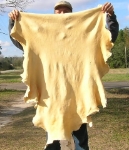I couldn't have an apiary if I wanted one. Being in town some of the folks around here would frown at me. And they know how fearful I am of frowns. Of course, bees don't mind traveling a small distance and since the edge of "civilization" is only a few blocks there may well be a new aviary nearby. I'll have to keep a sharp eye peeled.
No fear of Africanized bees either. We could have some Canadian bees, though. I'm sure I heard one the other day as it flew by....buzzzzz, eh. buzzzz, eh. Maybe it was French Canadian. (shrug)







 Reply With Quote
Reply With Quote







Bookmarks